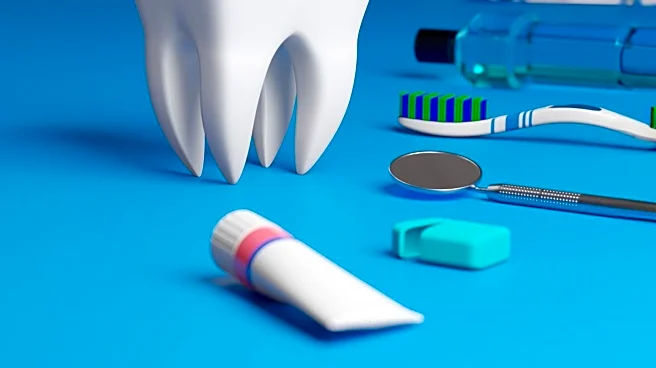What's Happening?
Recent insights highlight how dental health can serve as an early indicator of various systemic health issues. Dentists are often the first to notice signs of underlying health problems through changes in oral health. Conditions such as enamel erosion,
gum discoloration, and tooth mobility can signal issues ranging from nutritional deficiencies to more serious conditions like osteoporosis and kidney disease. For instance, persistent enamel erosion may indicate frequent exposure to stomach acid, often linked to eating disorders. Similarly, pale gums can be a sign of anemia, while loose teeth may suggest osteoporosis. These oral symptoms can prompt further medical investigation, potentially leading to early diagnosis and treatment of these conditions.
Why It's Important?
The connection between oral health and systemic health underscores the importance of regular dental check-ups as a preventive measure. Identifying health issues early through dental examinations can lead to timely interventions, potentially reducing the risk of more severe health complications. This approach benefits both individuals and the healthcare system by promoting early detection and management of diseases. For patients, it means better health outcomes and quality of life, while for healthcare providers, it can lead to more efficient use of resources. The awareness of this connection can also encourage individuals to maintain better oral hygiene, which is crucial for overall health.
What's Next?
As awareness of the link between oral and systemic health grows, it is likely that dental professionals will play an increasingly important role in the early detection of health issues. This may lead to more integrated healthcare approaches, where dental and medical professionals collaborate more closely. Patients may also become more proactive in seeking dental care as part of their overall health maintenance. Additionally, further research into the connections between oral health and systemic diseases could lead to new diagnostic tools and preventive strategies.
Beyond the Headlines
The implications of these findings extend beyond individual health, touching on ethical and policy considerations. There is a need for policies that ensure access to dental care for all, as disparities in access can lead to unequal health outcomes. Moreover, the integration of dental and medical records could enhance patient care by providing a more comprehensive view of an individual's health. Culturally, this development may shift perceptions of dental care from a cosmetic or secondary concern to a fundamental component of healthcare.
















